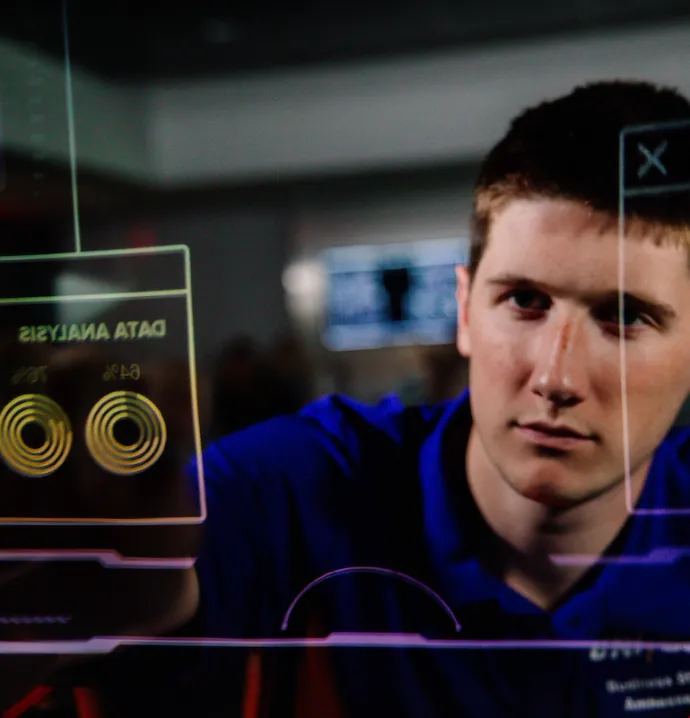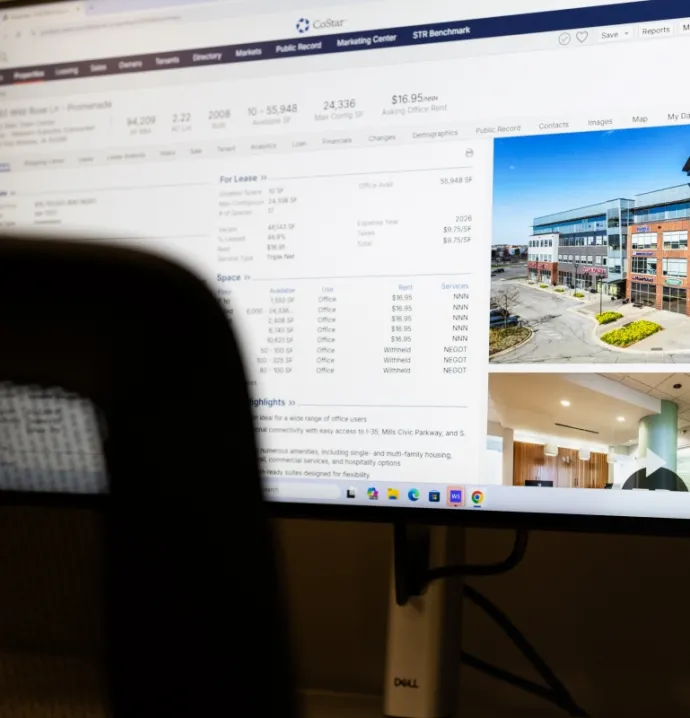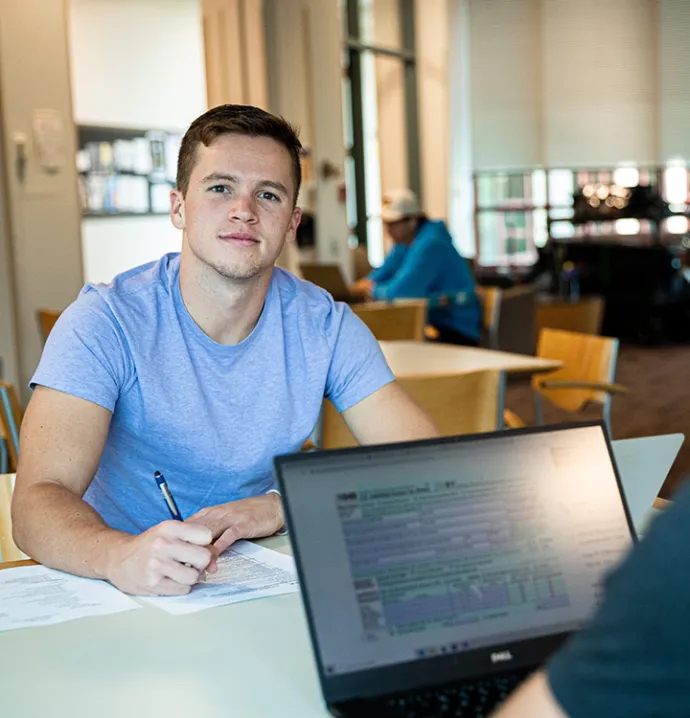Can we find common ground on sustainability?
Can we find common ground on sustainability?
Bob Inglis, a former U.S. congressman from South Carolina, has a friend in the recycling business. Whenever Inglis discusses the topic of sustainability, the environment and how to tackle these issues, he gets a simple but practical answer from his friend: “Sustainability means making a profit.”
“That’s what he tells me,” Inglis said. “Fixing economics is key, and sustainability becomes sustainable because it’s profitable.”
Inglis is truly trying to make sustainability profitable. That’s how he believes everyone can get behind the sustainability cause.
He represented South Carolina’s 4th District from 1993 to 1999 and again from 2005 to 2012. He’s the executive director of republicEn.org, an organization made up of a group of conservatives dedicated to promoting free enterprise action on climate change. Inglis visited UNIBusiness on Feb. 26 to deliver an Aldo Leopold Distinguished Lecture titled “How Do We Discuss Controversial Issues in a Polarized Country?”
The political polarization in the United States is such that it has become difficult to discuss important issues facing the country, including sustainability.
By definition, sustainability is the ability to exist constantly. More recently, sustainability has been used to refer to the environment and ecological needs, recognizing that the planet has a finite amount of resources and
space. For the most part, both sides agree there is an issue around sustainability and the environment, but the extent of the issue and how to address it are up for debate.
Much of that divide is along political lines. In a 2017 study by Pew Research, which tracked 10 political values, there was an average 36-percentage-point gap between Republicans and Republican-leaning independents and Democrats and Democratic leaners. In 1994, that gap was only 15 points.
“We’ve gotten to a place of seeing the other side as an enemy rather than a compatriot,” Inglis said. “That’s surely something that has to be changed, because America needs and wants both sides.”
In his lecture at UNI, Inglis addressed the need to open the conversation to bring in a variety of thoughts. Being a conservative himself, he’s particularly fixated on guiding conservatives into the sustainability conversation.
Inglis brings up Milton Friedman, a Nobel Prize-winning economist and an adviser to Republican President Ronald Reagan. Inglis talks about the economy being the key factor in environmental issues. And, like his friend in the recycling business, he mentions profits and business motivations as a way to promote more sustainable, renewable energy sources. These are all names and terms conservatives recognize, he said.
Sustainability is typically viewed through the lens of morals and ethics, Inglis said, but looking at the issue through an economics perspective is one way to garner support from people on both sides of the debate.
Inglis’ solution to incentivizing sustainability is to even out the economics of energy by putting a tangible cost on pollution — a tax on carbon emissions, for example. That would encourage free enterprise and innovation and eventually lead to more solutions, he argues.
“What we believe is sustainability is mostly going to come through good economics,” Inglis said. “When it becomes economical and reasonable to conserve and use renewable energy because of the fixing of the market, then it will happen.”
Becca Flynn Kettman (Marketing, Economics ‘14) is on the front lines of the environment and sustainability every day. She’s an Oak Ridge Institute for Science and Education (ORISE) Fellow with the U.S. Environmental Protection Agency, working with the department’s Office of Water.
Flynn Kettman graduated from UNI with a business background, but underwent a professional change a couple of years into her career. Her next interest came from a trip she took to California after receiving her undergraduate degree. She saw the beauty of the environment, but she also recognized there were problems.
“On the coast of California, there was leftover netting on the coast and birds trapped in them,” Flynn Kettman said. “That’s when I decided there was something I could do to help. Maybe I can learn more about these issues. I wanted to know more.”
She was accepted into graduate school, studied environmental science and then joined the fellowship program in September 2018. Flynn Kettman is passionate about sustainability and believes there is a need to have a discussion around how to become more environmentally friendly.
Her proposed solution is to make sustainability a local and relevant issue — make it personal. That way everyone can relate and perhaps become more open to talking.
“We do need to talk about sustainability,” Flynn Kettman said. “It needs to be around communities and stories. People need to find the relevancy in their own lives rather than thinking that the problems are something distant or something that will happen in 10 years. Maybe making it relevant to people’s lives will draw more positive attention to it.”
Just having the sustainability discussion between two opposing viewpoints is important, and in Flynn Kettman’s experience, that hasn’t been happening. If the United States wants to become more sustainable and preserve resources for the next generation, it’s going to take everyone working together, she said.
“It’s important to define sustainability, and meet our needs so our kids have the ability to meet their needs as well,” she said. “It’s important for the economy, it’s important for people and it’s important for the environment. If we come together, we can find a solution that addresses all three of those pillars.”
Other institutions can help bridge the divide
Ten years ago, sustainability was on the fringe of the radar for most businesspeople, said Craig VanSandt, UNIBusiness associate professor of management and the David W. Wilson Chair in Business Ethics. Most businesses thought it might be a problem, but not necessarily a big deal at the moment.
But sustainability has become an issue businesspeople are starting to take seriously, VanSandt said. And that’s important because businesses can play a key role in bridging the political divide by employing sustainability models that work.
“Businesses are in a position in the social realm to take a leadership role,” he said. “We often think of government as the proper entity to do things for the common good. But with things being politicized the way they are, businesses are starting to realize that, like it or not, they have the capital resources, the skills for innovation and the organization to carry things out efficiently.”
“Business is going to be the one, almost by default, that ends up addressing many of these issues.”
VanSandt works intimately with businesses and how they approach sensitive issues. He studies ethical practices and helps educate students on current problems facing business. At a high-level view, VanSandt acts as a catalyst for high-quality research and debate regarding business ethics and the role of business in society.
That’s how sustainability fell onto his radar. As the debate around climate change and sustainability has become more prominent and politically charged, he’s looked at how businesses have responded.
So far, it’s been slow.
While businesses are increasingly recognizing the need for sustainability, the political polarization has made it difficult for them to discuss the topic, VanSandt said. They are still largely driven by profit motive. And unless businesses can demonstrate to their shareholders that addressing sustainability helps profits, it’s hard to move forward and create a model for people on both sides of the debate to support.
“If you think about it, one aspect of sustainability is business being profitable and continuing operations,” VanSandt said. “In some ways, that’s the short-term view of sustainability. When you start talking about the ecological idea of sustainability, that’s the long-term view. Businesses have to find a way to balance out those two ideas and be a model for others.
“The fact that there are a lot of companies starting to do this does bring notice to the public that this is something we can all do.”
Given the gridlock in both the political and business realms, VanSandt brought up another place where real discussion around sustainability can happen: academic institutions.
He believes these institutions play a role in serving as a convener of people. Colleges and universities are centers of learning and research, and they should play a key role in bringing people together to talk about issues, particularly sustainability, VanSandt argued.
“Right now, the political realm doesn’t want to touch it — it’s the proverbial third rail,” he said. “Business is starting the process of saying this is important to us and we need to talk about it, but there is still some risk involved with action. This is something universities ought to be pretty active in and trying to get businesspeople and politicians to talk.”
UNIBusiness has taken the lead by inviting Inglis to talk to faculty and students on political polarization and sustainability. But going forward, all three institutions — government, business and learning centers — will have to work together to promote healthy discussion and find solutions toward a sustainable future, VanSandt said.
That means inviting opposing viewpoints to the table and keeping an open mind, he added.
“It’s going to take all of us to find some beneficial resolution,” VanSandt said.




